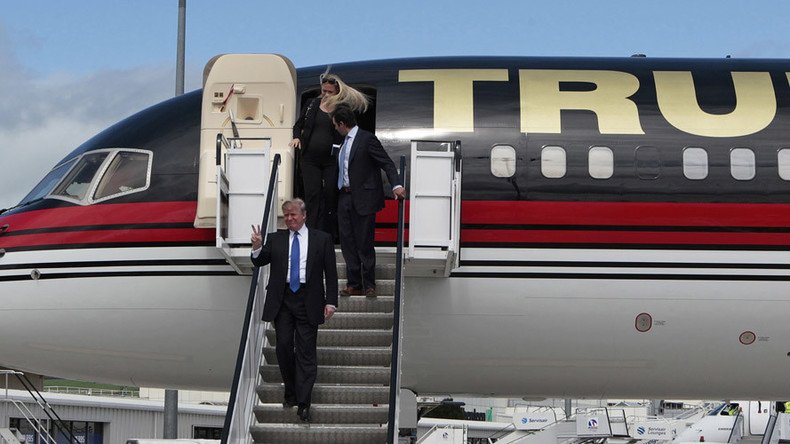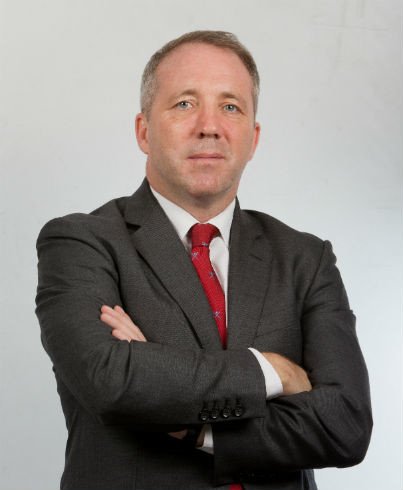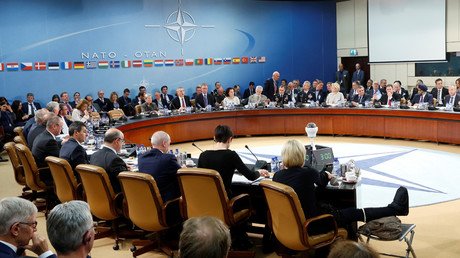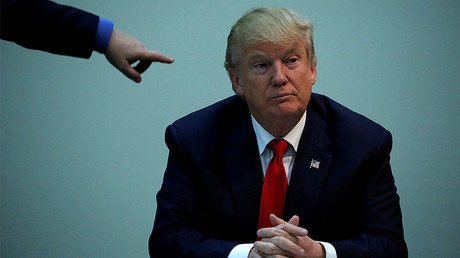Trump & Europe: It might not work, but it will be different

Donald Trump appears as a threat to many European elites, and even if he has no political record, they should be wary. For he does have a plan.
Trump is inconsistent, brash and he is scaring European leaders and institutions who have been comfortable for so long. They hope that he will back off his most outspoken plans for Europe. His targets will find hints at a grand plan in that most beloved US product – the automobile.
Many things will make Donald Trump a unique President. It is his complete lack of a political record, however, that terrifies European leaders most. Not since Dwight D. Eisenhower in 1952 has the United States acquired a President who has had no political post before his election. And even with Ike Eisenhower, it was safe to assume he was pro-European, as he had just helped save the Continent from Nazi oblivion.
Every other President since 1945 had some political record to analyze, to assess whether the election promises, crazy or otherwise, actually made it onto the statute books. Analyzing a new incumbent one could observe; “Well he said that in the election, but his record shows he softened (or hardened) when he got into office.”
Predictions of what Trump will do are conjecture based on little evidence. This is what is driving the European establishment crazy. Still, there have been events since his election in November that indicates Trump means business. What he said is bad news for the already tired and embattled institutions, like NATO and the European Union, that for so long expected unqualified American support. Since the election, he has been confined mostly to Twitter comment.
As his Friday inauguration approached Trump has emerged from relative silence.
Writing my inaugural address at the Winter White House, Mar-a-Lago, three weeks ago. Looking forward to Friday. #Inaugurationpic.twitter.com/S701FdTCQu
— Donald J. Trump (@realDonaldTrump) January 18, 2017
Last Monday Trump gave a simultaneous interview with The Times of London and German newspaper Bild, where he said many NATO member states were not paying their fair share for US protection.
“A lot of these countries aren’t paying what they’re supposed to be paying, which I think is very unfair to the United States," Trump said, “There are five countries that are paying what they’re supposed to. Five. It’s not much.”
The US spends a gargantuan $650 billion on defense annually, and you may say that’s their problem. But it’s not. If you are a member of NATO, besides getting to ally yourself with the world’s most spectacularly armed nation you must sign up to the rules. Those rules say that a member country should spend more than two percent of its GDP on defense. The US’ $650 billion is 3.61 percent of its GDP, top of the list of NATO members’ spending. Astonishingly, Greece, that economic basket case, is at No 2 on the list, spending 2.38 percent of its GDP on defense. Here’s the full list of contributions.
Even more astonishing is the list of countries who aren’t keeping up. France, Turkey, Germany, Italy and Canada - all economic powerhouses - are paying less than the two percent. Donald is going to sort that out. He also repeated his election claims that he believes NATO is past its sell by date. With his positive signals to Vladimir Putin, this statement wasn’t a total surprise. NATO, after all, was originally established to oppose Soviet Russia.
If Donald Trump is consistent on anything it is this: the USA has been taken advantage of for too long - by its own lethargic leaders and by foreign countries that no longer fear it. NATO members - all of which, bar the USA and Canada, are European - have become utterly reliant on America. And when called on to assist the Yanks on their foreign ventures they appear very reluctant to leave their barracks.
But you’re never on sure ground with Trump. There had been fears that he would introduce a bunch of loons to his Cabinet. Yet his Secretary of State Rex Tillerson, who will govern foreign policy, is a former head of ExxonMobil and is as establishment as you can get. He hasn’t backed the attacks on NATO, opposes a ban on Muslim immigrants and is less than effusive about Putin.
Trump's pick for Secretary of Defense, retired US Army General James Mattis, is a former Supreme Allied Commander of NATO and has voiced unequivocal support for the alliance - and said he had said as much to Trump.
Trump himself said NATO was “important.” His criticisms of NATO appear to be part of a grand plan. The plan to get what Donald Trump wants for America.
“I took such heat when I said NATO was obsolete," Trump told The Times, referring to comments he made during his presidential election campaign. "It’s obsolete because it wasn’t taking care of terror. I took a lot of heat for two days. And then they started saying Trump is right.”
Simultaneously, he was also critical of the immigration policy of Angela Merkel, who has admitted to Germany one million refugees from the Syrian conflict.
“And no one knows where they come from at all. You will find out; you’ve had a clear impression of that,” he said, referring to the December attack in Berlin in which 12 people were killed when a lorry driven by an asylum seeker from Tunisia careened into a Christmas market. The attacker, Amis Amri, crossed three European countries before being shot by Italian police.
The Merkel admission of refugees was "a catastrophic mistake" said Trump.
By linking immigration and NATO, he is stressing that his friends are failing to uphold their end of the deal. It’s now a new deal. The least the US can expect for giving its financial and military might to NATO is for its members in Europe to protect themselves and by extension the US and the world from terrorism. Trump will expect increased draconian restrictions on the movement of potential terrorists, as well as greater financial contributions if NATO is to survive.
‘This [US intelligence] report does not correspond to reality and is nothing but an absolute fiction’ – Kremlin https://t.co/CVCJwtGQIP, pic.twitter.com/s8OCr7MhTg
— RT (@RT_com) January 11, 2017
The president-elect also suggested that travel restrictions on Europeans wanting to come to the US could be tightened.
Trump is rock solid (well, as solid as The Donald can be) on that product that is central to the American dream – the automobile.
To the Bild interviewer he said; “If you want to build cars in the world, then I wish you all the best. You can build cars for the United States, but for every car that comes to the USA, you will pay 35 percent tax.
"I would tell BMW that if you are building a factory in Mexico and plan to sell cars to the USA, without a 35 percent tax, then you can forget that," Trump said.
German car manufacturers have invested massively in Mexico. After Trump’s saber rattling Volkswagen shares closed down 2.2 percent, while BMW's shares ended 1.5 percent lower.
Cars you say? But the European establishment will be astute enough to know that one thing Donald has constructed a record on since his November election is cars.
Throughout the US Presidential election campaign, Trump’s most enduring theme was that he would cajole or force US corporations to bring their business back to the Homeland. In particular, large employers, like car manufacturers would be incentivized to return. And if they were in Mexico, they most of all would be pressured back to the US.
It is the rusting former factories and car manufacturing plants in states like Michigan and Ohio that gave the Rust Belt its name. It was this disenfranchised region that, by moving away from the Democrats that swung the election his way.
On 3 January Trump announced on his favored medium, Twitter, that Ford that most iconic of American car brands had been listening.
Ford canceled plans to build a new $1.6bn factory in Mexico and said it would invest $700m in a Michigan plant to build vehicles.
"@DanScavino: Ford to scrap Mexico plant, invest in Michigan due to Trump policies"https://t.co/137nUo03Gl
— Donald J. Trump (@realDonaldTrump) January 3, 2017
He has done his homework. A US President can raise tariffs on foreign goods coming into the States without the approval of Congress.
Donald Trump could just be as serious about everything else he has said as he has been about cars. He has threatened US companies like Google, Twitter and Amazon that he will go after the tax avoidance arrangements that they have with low corporate tax nations across Europe.
All this comes down to money, money that he believes will make America great again. By forcing Europe to start paying its way it eases the burden on the US.
But he has spoken, too, on geopolitics and strategy and there have been psychological blows to Europe almost as impactful as the financial threats. He has backed Britain in its battle to leave the EU saying it could “end up being a great thing.” He predicted that other countries would also leave.
He has refused to give the previously unquestioning support to leaders of certain countries, like Germany, where it would have been expected.
Asked whether he would trust German Chancellor Angela Merkel or Vladimir Putin more, Trump said: “Well, I start off trusting both --but let’s see how long that lasts. It may not last long at all.”
Europe’s leaders were stunned by the statements he made on Monday. Their responses were ponderous.
German Foreign Minister Frank-Walter Steinmeier said Trump's views on that NATO was obsolete had “caused astonishment.”
At a meeting of EU ministers, French Foreign Minister Jean-Marc Ayrault said the best response to such comments was simple “it is the unity of the Europeans.” Whatever that means.
In Berlin, German Chancellor Angela Merkel insisted: “We Europeans have our fate in our own hands.”
“I'm personally going to wait until the American president takes office, and then we will naturally work with him on all levels,” she told reporters.
French President Francois Hollande was a little more defiant.
Europe “has no need for outside advice to tell it what to do.”
“Europe will always be willing to pursue trans-Atlantic cooperation, but it will base its decisions on its interests and its values,” he added.
The Old World, consensus politicians, in their tired and bland replies, just looked out of touch compared to the new and brash Trump.
Trump beat Hillary Clinton and the liberal elite establishment in the US by tearing down previously unthreatened ivory towers. He attacked fundamentalist Islam. He said he’d give the working men back their jobs. He took on political correctness, going way too far in many cases.
What Europe fears is that he is threatening institutions that have been comfortable, elitist and unanswerable for too long. NATO is an anachronism if Trump changes the world order. He can do business with Britain, not the EU. He can do business with Putin and not Merkel. It mightn’t work but it is going to be different.
The statements, views and opinions expressed in this column are solely those of the author and do not necessarily represent those of RT.















